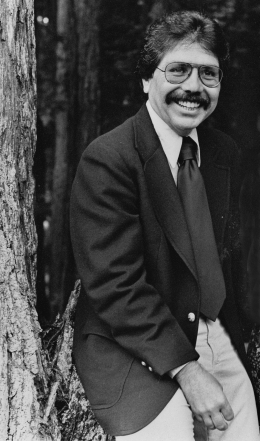 183 pages
183 pages
2013
For the complete text [PDF] of Professor Pedro Castillo: Historian, Chicano Leader, Mentor on the University of California's e-scholarship site. Includes complete audio (streaming or download) for the oral history. Note: Due to editing by the narrator and the Project, there may be minor differences between the audio recording and the transcript. Please quote from the transcript as the record and not the audio. Audio will be found under "Supporting Material."
Pedro Castillo was hired by UC Santa Cruz’s history board in 1976, and affiliated with Merrill College. At UCSC, Castillo collaborated with professors in other disciplines in interdisciplinary team-teaching small seminars such as Studies in the American City, which in 1977 focused on Chicago and Los Angeles, and an oral history course documenting social, cultural, political organizations in the nearby working-class and primarily Latino city of Watsonville. These courses exemplified the intimate and creative learning atmosphere of UC Santa Cruz in the 1970s. Castillo was also an early affiliate of UCSC’s American studies program and served as its chair in 1984.
Castillo provides a detailed narration of the history of UCSC over the past four decades, particularly the development of the history and American studies departments and Merrill and Oakes College. He was one of the first Chicano/a professors hired at UC Santa Cruz and is now the one with the longest tenure and memory of the institution. He explores those memories in this oral history, describing the climate for Chicano/a and Latino/a faculty, staff, and students at UC Santa Cruz from the 1970s through the first decade of the twenty-first century. He discusses faculty appointments, changes in the curriculum, and student activism. In his long career at UCSC, Castillo served as a mentor and inspiration to many UCSC students, especially Chicano/Latino students, who found him accessible, attentive, and encouraging.
In 1990, Professor Castillo and literature professor Norma Klahn cofounded and codirected UCSC’s Chicano/Latino Research Center (CLRC), with funding from the Office of the President, among other sources. For many years, under a series of rotating directors, the CLRC has been a dynamic and creative research institution, supporting graduate student and faculty research with mini-grants, hosting lecture series and organizing conferences, and mentoring undergraduate students in learning to do research. The CLRC is closely connected with UCSC’s Latin American and Latino Studies department, which Castillo also played a part in developing, and it is currently being revitalized after suffering recent budget cuts.
From 2002 to 2008 Castillo served as provost of Oakes College. He and Shirley lived in the Oakes College provost’s house and enjoyed the direct contact with students, where they hosted students, staff, and faculty. Castillo characterized his term as provost of Oakes as the “highlight of his tenure at UC Santa Cruz.”
More so than most UC professors, Castillo has stepped beyond the academy and become involved in the local communities of both Santa Cruz and Watsonville, where he has lived for many years. He served on the Parks and Recreation Commission in Santa Cruz, helping to implement the Heritage Tree Ordinance. Later he served on the Planning Commission, the Library Commission, the Pajaro Valley Community Health Trust in Watsonville; the Steinbeck Center in Salinas, and the Community Foundation of Santa Cruz. He has also worked to support candidates for city council and other offices in both Santa Cruz and Watsonville. He is now writing a comparative political history of electoral politics in Watsonville and Salinas, California.
Castillo’s political and cultural work extended beyond Santa Cruz County. In 1992 and again in 1996 he was chosen to be a Clinton delegate to the Democratic National Convention. He was a member of the National Council of the National Endowment for the Humanities from 1999 to 2004 and the California Council for the Humanities from 1999-2000.

 Santa Cruz, CA
Santa Cruz, CA



